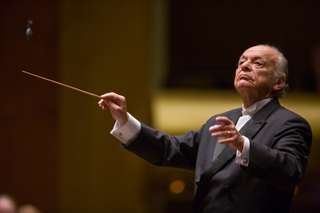|
Back
Hails and (Not Quite) Farewells New York
Avery Fisher Hall, Lincoln Centre
06/24/2009 - & June 25, 26, 27, 2009
Gustav Mahler: Symphony No. 8 (“Symphony of a Thousand”)
Christine Brewer, Nancy Gustafson, Jeanine De Bique (Sopranos), Mary Phillips, Nancy Maultsby (Messo-sopranos), Anthony Dean Griffey (Tenor), Wolfgang Schöne (Bass), Jason Grant (Bass-baritone)
New York Choral Artists, Joseph Flummerfelt (Director), The Dessoff Symphonic Choir, James Bagwell (Director), Brooklyn Youth Chorus, Diane Berkun (Director), New York Philharmonic Orchestra, Lorin Maazel (Music Director and Conductor)

Maestro Lorin Maazel (© Chris Lee)
Lorin Maazel could have surprised us all by going out with a whimper. A set of Teleman flute concerti? Perhaps Kettleby’s In a Persian Garden.
But that is hardly the modus operandi of Lorin Maazel. He went out with a bang—one of the biggest bangs in symphonic history, a bang which originally was played with more than a thousand participants (thus the modest name “Symphony of a Thousand”). And while Mr. Maazel had to be satisfied with less than half that number, the combination of eight soloists, two or three choirs, children’s choir and the huge Philharmonic Orchestra (including a brass consort way up in the balcony) guaranteed that nobody would forget these nights.
Alas, this evening, whose music was the apotheosis of sublimity, glory and heavenly glory, commenced with a Rotary Club-style speech by Paul B. Guenther, an official of the orchestra. He quoted a politician (Michael Bloomberg), twice uttered a jingoistic anodyne that “the Philharmonic is the greatest orchestra in the world”. He (correctly) praised Mr. Maazel’s accomplishments, and (incorrectly and repeatedly) mentioned that the visit to Pyongyang was one of its greatest accomplishments.
Well, no, That was a political coup, but its greatest accomplishments have been its music, and Mr. Maazel, after (correctly) proclaiming this “Gustav Mahler Night” proceeded to show how very adept he is in making rafters ring, audiences to go frantic, and the New York Philharmonic to play as well as possible.
Which, whether “the greatest” or not, is damned good!
Mr. Maazel got right down to business with the loudest organ chord I’ve heard yet from the stage, and the great choral introduction to 80 minutes of bliss. That opening was not only crisp, but it crackled, and the choruses soared.
True, Mr. Maazel took a shortcut, using the same choruses and many of the same soloists as Britten’s War Requiem two weeks ago, but that shortcut led to a knowledge of handling the multiple vocal ensembles.
It is no insult to say that the choruses were Victorian-Handelian, for this is what the symphony deserves. The tunes of the chorus—certainly not the orchestra—have an easily accessible grandiosity which might be considered more polemic than original. (“Let’s get the point across: this is a serious subject about life, death and the meaning of the soul. And don’t you forget it!!”)
But when it comes to the last five minutes of the Eighth Symphony… well, no musician, artist, worker, rapper, rocker or Ayatollah could hear such absolutely pure beauty without weeping. It’s that kind of music.
Leave it only be said, that the Brooklyn Youth Chorus carrolled with lilting grace, and the two “adult” choruses made their almost constant lauds resonate out with all the grandeur necessary.
The soloists, as in the Britten, stood on either end of the stage. This sometimes led to a verbal blurriness in when all sung together, but the soloists were each monumental in their own way. Added to the Britten group was the great Christine Brewer, and her solos in the second part of the Symphony had that triumphant and warm breadth of sound which is so necessary here.
I do confess to having always longed for a good conductor to take the sheerly orchestral sections of the Eighth, eliminating the voices, to make a new work entirely. For after the introduction, the orchestra plays music which is so different from the usual Mahler, so close to an atonal march, that its interest is as cerebral as it is visceral.
That probably will never happen, which is a shame, since Maestro Maazel conducted them with such fierce passion. This was not an especially warm performance (until the end), but it was obvious that Maestro Maazel loves each player of the New York Philharmonic. He made them play with electricity, note-perfect crispness and almost brusque efficiency.
Which left choruses and soloists to carry the emotional load of the piece. No problem there, at all.
As for Mr. Maazel, he is hardly retiring (or the retiring sort!). He has his own festival next month, dozens of guest appearances, more composing, more of what he does best.
I once asked Sir Georg Solti about certain modern music, and he simply smiled. “At my age,” he said, “I am more anxious to go over the pieces I know best, to find how to make them play the best.”
Mr. Maazel might respect such sentiments, but he is not one to remain in the past. As Mahler glorified Faust in the Eighth Symphony, Maazel trties to glorify the past and introduce the future. It's a helluva challenge, but a heaven-given talent to take those awesome chances.
Harry Rolnick
|